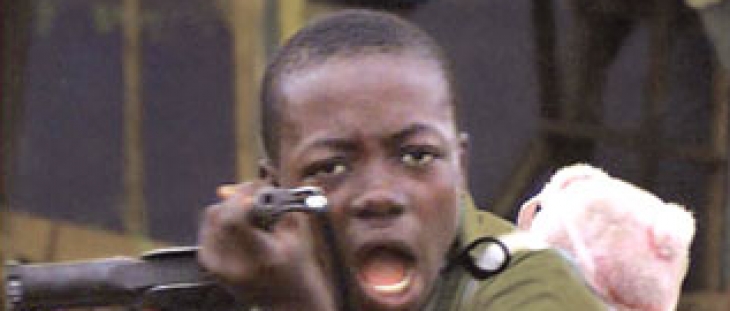
On the other side of the AK-47 that was pressed to Romeo Dallaire’s nose, was a quivering, wide-eyed young boy, sweating as his finger danced with the trigger. To this day, Dallaire believes it was the chocolate bar he was holding that distracted the erratic child soldier, causing him to lower his weapon.
Such was the nature of the discussion and the degree of the scenes and anecdotes shared by Senator Romeo Dallaire and Stephen Lewis at Friday’s PEN discussion, ‘They Fight like Soldiers, They Die like Children’. Appropriately named after Dallaire’s latest book, it was an instalment of the Ideas in Dialogue series put on by PEN Canada – an independent, non-profit organization that fights to defend freedom of expression by campaigning for writers around the world who are persecuted for their thoughts. Held at the ROM, Dallaire and Lewis were in conversation over the eradication of the use of child soldiers, supported by their vast combined experiences in the nations of Africa.
While serving as the commander of the United Nations troops in Rwanda in 1994, Dallaire witnessed the brutal and grotesque genocide that claimed the lives of hundreds of thousands. Upon his return he suffered from extreme Post Traumatic Stress Disorder as a result of witnessing the horrors of the genocide, among them, the use of children as weapons of conflict.
Similarly, Lewis, as the former UN Envoy for Aids in Africa, has witnessed relentless death and despair in the tumultuous continent. The conversation that ensued on Friday was candid, thought-provoking, shocking and innately grim. Yet, above all else, it was inspiring.
There are currently 17 active conflicts in the world where children act as combatants, and recruitmentof child soldiers is occurring in 31 nations worldwide – totalling a quarter of a million children. Dallaire revealed, to a shocked audience, that 40 per cent of these children are females. Whereas boys are used only as warriors, he explained, girls are far more useful, filling a wide host of roles: leading and commanding other child soldiers, running logistical teams (that collect food, and carry water and ammunition) and filling the roles of sex slaves and bush wives for the adults and commanders.
“You can’t find a more end to end, sophisticated, low technology weapons system in the inventory,”said Dallaire, whose extensive research on child soldiers has caused him to acknowledge this deplorable reality.
Following the Cold War, the world had an abundance of small arms; rather than obliterating the weapons, they were sold largely to African nations. These weapons are light, making them easy for a child as young as eight to haul around and operate. In addition to the proliferation of weapons, the population of many of these Sub-Saharan countries is largely under 15 years of age, making it easy to abduct throngs of youth who are then easily controlled through fear, indoctrination, abuse and drug use.
Lewis, too, has had face-to-face encounters with child soldiers. While working with UNICEF in the late 1990s in northern Uganda, The Lord’s Resistance Army, an extreme religious group headed by a man named Joseph Kony, were abducting thousands of children for use as soldiers and sex slaves. Lewis spoke with some of the children who were fortunate enough to have escaped Kony’s army. The boys, he said, were so scarred from battle that it was often difficult for them to talk. The girls could not communicate at all.
When these children return to their communities, if they ever do, the boys are usually accepted and rehabilitated. The girls are often exiled; when a female has been abused she’s deemed unacceptable. “The girls feel guilty of having been abused, so strong is this horrible cultural stigma that’s put on them,” said Dallaire.
Still, there is support. Lewis attended the opening of a sexual violence rehabilitation community, called the City of Joy in Bukavu in the Democratic Republic of the Congo, where 3,000 women gathered – all of whom had been raped and gang-raped. “You could not contain the determination, excitement and the joy of what they had achieved and the strength of overcoming what was happening in the Congo.”
A recent announcement that The Global Fund, the firm that provides half of the HIV/AIDS drugs for the developing world, is cancelling their next level of treatment looms. Yet, this African population that faces dire circumstances has an optimism and resilience that is unimaginable.
It’s not often as easy as positive thinking, though. The protocol for most armies, worldwide, when it comes to child soldiers, is basic: if they’re armed, they’re considered a combatant. This is where Dallaire’s Child Soldier Initiative comes in. The aim of Dallaire’s initiative is to eradicate the use of child soldiers using a mix of humanitarian, academic and security components, rather than force. He wants to completely remove the very idea of using child soldiers as weapons of war from the minds of adults.
Dallaire and Lewis both expressed beliefs that nation states should be held accountable when they have the means and capabilities to help prevent a pandemic, agenocide, the issue of child soldiers etc. in developing nations and do not exercise them. In the context of the Global Fund, because of the nations that have backed out of their financial commitment -Germany, Sweden, Belgium, Italy, among others – 7.6 million people who desperately need treatment will not be enrolled in the drug program that is capable of defeating the pandemic.
“This is a crime against humanity. These governments know what the consequences are and they’re just not prepared to respond,” said Lewis.
In concluding the discussion, Dallaire offered a final anecdote. He and some troops were driving on a stretch of deserted road in Rwanda, when suddenly a little boy appeared in front of them, about 5 or 6 years old. He was alone–only the remains of those who had been killed weeks before were splayed around him. Dallaire picked up the boy, whose clothes were dirty and his stomach bloated, and looked into his eyes.
“What I saw in the eyes of that little boy was exactly what I saw in the eyes of my seven-year-old son’s. They were the eyes of a human child, and they were exactly the same. That boy in the middle of that genocide counted just as much as my son back home. But what happens to him? And why do we tolerate it? Why do we tolerate war based on using children as the primary instrument of war?”














